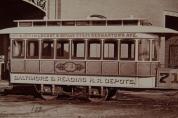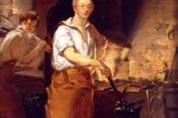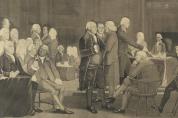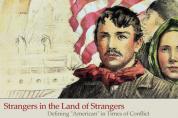HSP Legacy Exhibits
HSP Legacy Exhibits
These exhibits were created between 2000 and 2011 and are presented here in their original format. Please note, they may contain broken or missing hyperlinks or outdated information.
|
The Coxe Family Mining Papers were donated to HSP by the Coxe family in 1967. From 1999 to 2001, with funding from the National Historical Publications and Records Commission and the Pennsylvania Historical and Museum Commission, these important records were organized, described, and preserved. The collection, consisting of more than 1,000 boxes and upwards of 300 volumes, richly documents the history of what once was the largest independent anthracite coal producer in the United States. |
|
The J.G. Brill Company and its various incarnations dominated the world of trolley and undercarriage manufacturing for most of its seventy-year history. Based in Philadelphia, Brill was founded in 1868 by a German immigrant and held in family hands well into the 1930s. At its height, The J.G. Brill Company owned plants in six states as well as in Canada and France. |
|
In this exhibit, we follow Pennsylvania's governance from 1701 to the present, watching as new peoples come to settle in Pennsylvania, as they reach for their rights and liberties, and as the meaning of liberty stretches and grows to meet them. We hope that visitors will gain understanding of how the heat of debate and the force of change create and preserve liberty and self-government even into our own time. |
|
Because of its convenient geographic location, Philadelphia has always attracted political conventions. The two Continental Congresses met in Philadelphia and ultimately voted for independence. Probably the most well-known of Philadelphia's political conventions was the Constitutional Convention of 1787. This exhibit traces Philadelphia's rich history of conventions. |
|
In the 175 years since its founding, the Historical Society of Pennsylvania has evolved as an institution both in stated mission and physical presence. Formed on December 2, 1824, by a small group of Philadelphia gentlemen interested in "elucidating the history of the state," the Society's interests and methods of fulfilling that initial purpose expanded continually. So, too, did the size of the collections and the resulting need for room to display, preserve, and use these holdings. |
|
Though the United States has long taken pride in itself as a land of newcomers, adventurers, and people willing to embrace change, creating this nation from its many different peoples has always involved conflict and dissension. Especially in times of national crisis, the newest Americans have repeatedly labored to prove their patriotism and shield themselves from ethnically- and racially-motivated harassment. The continuing public discussion of loyalty has kept the meaning of "American" an active and evolving topic. |






